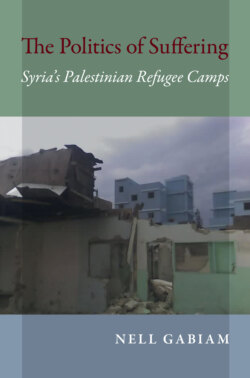Читать книгу The Politics of Suffering - Nell Gabiam - Страница 7
На сайте Литреса книга снята с продажи.
Acknowledgments
ОглавлениеWRITING THIS BOOK would not have been possible without the support of the Palestinian refugees of Ein el Tal, Neirab, and Yarmouk who opened their homes and lives to me between spring 2004 and spring 2006 and, under much more tragic circumstances, during spring and summer 2015. I am immensely grateful for the kindness and generosity they showed me and for the trust that they gave me. Syrian friends and acquaintances contributed to the generally warm and friendly atmosphere I encountered while doing fieldwork. I am also grateful to the United Nations Relief and Works Agency for Palestine Refugees (UNRWA) for allowing me to engage in participant observation during the Neirab Rehabilitation Project and to the UNRWA staff that I interviewed. The views expressed by UNRWA staff during interviews do not necessarily represent the official views of UNRWA as an agency.
The research that is at the origin of this book started roughly ten years ago while I was a graduate student in anthropology at the University of California, Berkeley. In the anthropology department, I am grateful to Donald Moore and Laura Nader, who provided crucial guidance and support from the very beginning and helped shape me as a scholar, and to Stefania Pandolfo for her useful feedback on an earlier incarnation of the book. Nezar AlSayyad, in the College of Environmental Design, has been a sympathetic and helpful reader and listener. I also benefited from the support of faculty outside uc Berkeley. I am particularly indebted to Dawn Chatty at the University of Oxford’s Refugee Studies Centre and to Ghada Talhami at Lake Forest College in Illinois, both of whom read and commented on earlier versions of the book. I am grateful for the encouragement and support I have received from my colleagues in the departments of anthropology and political science at Iowa State University, which has been my academic home for the last five years. The support of friends and colleagues helped sustain me during the grueling process of writing and attempting to turn what began as my doctoral dissertation into a book. I would especially like to thank Anaheed Al-Hardan, Salomé Aguilera-Skvirsky, Diana Allan, Leila Hilal, Ali Bangi, Christina Gish Hill, Alan Mikhail, Saida Hodžić, Derrick Spires, Lisa Calvente, Monica Martinez, Rosemary Sayigh, Ted Swedenburg, Lex Takkenberg, Alex Tuckness, Maximilian Viatori, David Vine, and Brett Williams.
Research for this book was made possible by a Fulbright (DDRA) grant, a Social Science Research Council-Mellon Mays research grant, a uc Berkeley Normative Time grant, and an Iowa State University Professional Development grant. A University of Chicago Provost Postdoctoral Fellowship (2009–2011) provided me with the time to write an initial draft. A Woodrow Wilson Career Enhancement fellowship (2014–2015) gave me the opportunity to take a sabbatical and focus on completing the final draft. My sabbatical year was spent at Georgetown University’s Center for Contemporary Arab Studies. I am grateful for the warm and welcoming environment and for many fruitful exchanges with the center’s faculty, students, and staff.
My gratitude extends to Indiana University Press and to the two anonymous reviewers for their incredibly helpful and constructive feedback. My thanks also go to Rebecca Tolen for her guidance and feedback and to the editorial and production team for the care and attention they gave the manuscript. I am grateful to Paul Silverstein, Susan Slyomovics, and Ted Swedenburg for welcoming the book into Indiana University Press’s series on Public Cultures of the Middle East and North Africa.
As a scholar, I was introduced to the Middle East and to the Palestinian refugee issue through an undergraduate anthropology class I took at Columbia University with Avram Bornstein on “Peoples and Cultures of the Middle East and North Africa.” It is through Bornstein’s class that I discovered my ignorance with regard to the world and, especially, with regard to the Palestinian question. I am grateful to him for inspiring me to want to learn more about the world I live in.
Finally, I wish to thank my biggest source of support and inspiration, my mother Mary Jo Gabiam. My mother spent seven years in Kuwait and a summer in Gaza as an elementary and middle-school teacher. It is through her that I discovered the Middle East as a real place and with her that I traveled to Syria for the first time, in 1999. Many of the early books I read on the Middle East and on the Palestinian question were plucked from her bookshelf. She read and commented on countless drafts of this book and has been a loyal companion on this long journey. It is to her that I dedicate the book.
